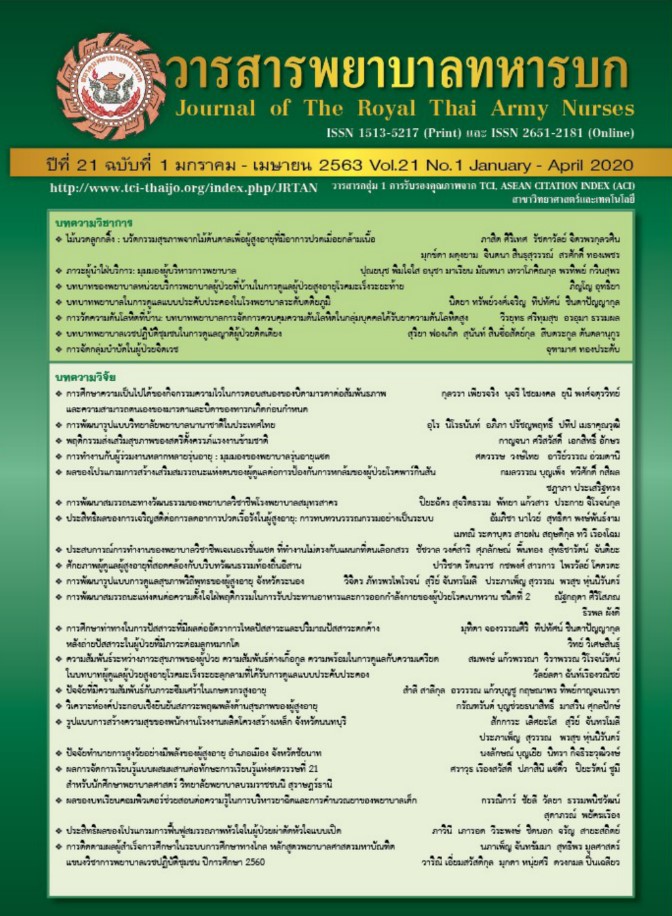Effects of Computer Assisted Instruction on Knowledge of Injection Administration and Medication Calculation of Pediatric Nurses
Keywords:
computer assisted instruction, knowledge, administration of injection, medication calculation, pediatric nursesAbstract
This quasi-experimental study (one group pre-test post-test design) aimed to determine the effects of Computer Assisted Instruction (CAI) on knowledge of injection administration and medication calculation of pediatric nurses. The sample included 21 registered nurses who had a working experience of less than 1 year from inpatient wards of Queen Sirikit National Institute of Child Health and inpatient pediatric wards of Vajira Hospital, Faculty of Medicine, Navamindradhiraj University. The subjects got CAI in a compact disk. They were asked to study CAI by themselves for 14 days. They were also asked to record the information each time they viewed CAI, including the title, number of times, date and time in a table of learning log. On the 7th day, the researcher called the subjects to ask about the problems in using CAI, reminded and encouraged them. The Assessment of Knowledge of Injection Administration and Test of Medication Calculation were used to assess the subjects’ knowledge before and after learning from CAI for 2 weeks. Descriptive statistics and Wilcoxon signed-rank test were used for data analysis.
The findings of the study revealed that after learning from CAI, the subjects had higher scores on knowledge of injection administration and knowledge of medication calculation than those before learning from CAI with statistical significance (p < .05). It is suggested that CAI may be used to teach newly graduated nurses through self-directed learning about knowledge of injection administration and medication calculation in care of pediatric patients.
Downloads
References
Hicks RW, Becker SC, Windle PE, Krenzischek DA. Medication errors in the PACU. J Perianesth Nurs. 2007;22(6):413-19.
Buck ML, Hofer KN, McCarthy MW. Improving pediatrics medication safety part 1: Research on medication errors and recommendations from the joint commission. Pediatr Pharm. 2008;14:1-6.
Gonzales K. Medication administration errors and the pediatric population: A systematic search of the literature. J Pediatr Nurs. 2010;25:555-65.
Crossman M. Technical and environmental impact on medication error in paramedic practice: A review of causes, consequences and strategies for prevention. JEPHC. 2009;7(3):1-10.
Lan YH, Wang KW, Yu S, Chen IJ, Wu HF, Tang FI. Medication errors in pediatric nursing: Assessment of nurses’ knowledge and analysis of the consequences of errors. Nurse Educ Today. 2014;34:821-8.
Murphy M, While A. Medication administration practices among children’s nurses: A survey. Br J Nurs. 2012;21(5):928-33.
Fasolino T, Snyder R. Linking nurse characteristics, team member effectiveness, practice environment, and medication error incidence. J Nurs Care Qual. 2012;27(2):E9–16.
Westbrook JI, Rob MI, Woods A, Parry D. Errors in the administration of intravenous medications in hospital and the role of correct procedures and nurse experience. BMJ Qual Saf. 2011;20(12):1027-34.
Tamarpirat N, Oumtanee A. Being a newly graduated nurse working under supervision of a mentor. Journal of The Royal Thai Army Nurses. 2017;18:32-40. (in Thai).
Supasiri S. Safe medication administration for inpatient service: Problem analysis. [master’s thematic paper], Department of Nursing Management,]. Bangkok: Mahidol University; 2008. 117 p. (in Thai).
Sears K, Goodman WM. Risk factors for increased severity of paediatric medication administration errors. Healthc Policy. 2012;8(1):e109-26.
Tang F, Sheu S, Yu S, Wei I, Chen C. Nurses relate the contributing factors involved in medication errors. J Clin Nurs. 2007;16:447-57.
Xu C, Li G, Ye, N, Lu Y. An intervention to improve inpatient medication management: A beforeand after study. J Nurs Manag. 2014;22:286–94.
Sung YH, Kwon IG, Ryu E. Blended learning on medication administration for new nurses: Integration of e-learning and face-to-face instruction in the classroom. Nurse Educ Today. 2008;28:943–52.
Crimlisk JT, Johnstone DJ, Sanchez GM. Evidence-based practice, clinical simulations workshop, and intravenous medications: Moving toward safer practice. Medsurg Nurs. 2009;18(3):153-60.
Boonkerd M, Boonpradit A. Effects of using computer assisted instruction on injection lesson of the first year nursing student of Bachelor degree program [Research report]. Saraburi: Boromarajonani College of Nursing,
PhraPutthabat; 2011. 54 p. (in Thai).
Mamom J. Computer assisted instruction (CAI): Educational technology to develop the knowledge and skills of nursing students. Thai Science and Technology Journal. 2014;22(2):286-93. (in Thai).
Thanakitpornpapha P. Effects of computerassisted instruction on knowledge and practices of nurses in prevention of bloodstream infection from hemodialysis [master’s thesis]. Chiang Mai University; 2010:117 (in Thai).
Erb-arb S, Leevirat S. Effects of computer-assisted instruction for aerosol administration therapy in children on nurses’ knowledge and medication management skills and on children’s respiratory response. Thai Journal
of Nursing Council. 2014; 29(4):105-20. (in Thai).
Kowtrakul S. Education of psychology. 11th ed. Bangkok: Chulalongkorn University Printing House; 2013:524 (in Thai).
Buranasak J, Limruangrong P, Pungbangkadee R. The effect of computer assisted instruction of abdominal examination on knowledge, abdominal examination skills and satisfaction of nursing students. Journal of The Royal Thai Army Nurses. 2014;15(3):361-70. (in Thai).
Khammanee T. Science of teaching: Body of knowledge for the management of effective learning process. Bangkok: Chulalongkorn University Printing House; 2011:502 (in Thai).
Gaesawahong R. The development of nurse residency program. Ph.D. in Social Sciences Journal. 2013;3(3):53-67.
Cohen J. Statistical power analysis for the behavioral sciences. 2nd ed. Hillsdale: Lawrence Erlbaum Associates; 1988. 567 p.
Lee TY, Lin FY. The effectiveness of an e-learning program on pediatric medication safety for undergraduate students: A pretest–post-test intervention study. Nurse Educ Today. 2013;33:378–83.
Pauly-O’Nell S, Prion S. Using integrated simulation in a nursing program to improve medication administration skills in the pediatric population. Nurs Educ Perspect. 2013;34(3):148-53.
Klausmeier HJ. Educational psychology. 5th ed. Cambridge: Harper & Row;1985:606
Downloads
Published
How to Cite
Issue
Section
License
บทความหรือข้อคิดเห็นใดใดที่ปรากฏในวารสารพยาบาลทหารบกเป็นวรรณกรรมของผู้เขียน ซึ่งบรรณาธิการหรือสมาคมพยาบาลทหารบก ไม่จำเป็นต้องเห็นด้วย
บทความที่ได้รับการตีพิมพ์เป็นลิขสิทธิ์ของวารสารพยาบาลทหารบก
The ideas and opinions expressed in the Journal of The Royal Thai Army Nurses are those of the authors and not necessarily those
of the editor or Royal Thai Army Nurses Association.






